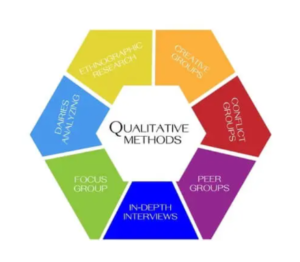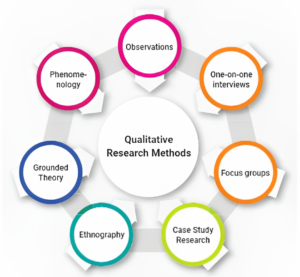Separating Myth from Reality: The Scientific Rigor of Qualitative Research
Many blogs on the internet are formulating that Qualitative research is unscientific and also many blogs are saying that it is scientific. So, what is the correct answer?
Well, we will help you gather knowledge about qualitative research and then finally, we will tell you the answer to what we think. So, let’s get started, but before that, we have a question.
How can we separate the myth from reality? For this, we have divided the blog into 3 segments. Now, let me ask you a question: how can we solve a problem? By going to the root of it, right? So, let us know the meaning of qualitative data first in order to separate the myth from reality.
Meaning Of Qualitative Data
Qualitative data is a type of data that describes the characteristics or qualities of an object, event, or phenomenon. It is based on observations, opinions, and subjective interpretations rather than numerical measurements.
Now, one of the most important questions is, why should we even choose qualitative data ? How can it help us to conduct better research? So, in the next part, we are going to get the answers to these questions.
Justification For Qualitative Research

Qualitative data has several advantages that make it a valuable research tool in many fields. Here are some reasons why researchers may choose to use qualitative data:
- Provides rich and detailed information: Qualitative data allows researchers to gather in-depth information about complex topics. It can provide detailed descriptions of people’s experiences, thoughts, and emotions that cannot be captured by quantitative data alone.
- Allows for flexibility: Qualitative data collection methods are often more flexible than quantitative methods. Researchers can adjust their questions and methods based on the information they are gathering, which can lead to more insightful data.
- Encourages participant perspectives: Qualitative data collection methods, such as interviews and focus groups, encourage participants to share their perspectives and experiences in their own words. This can lead to a deeper understanding of people’s experiences and perspectives.
- Generates new hypotheses: Qualitative data can help researchers generate new hypotheses and theories about a subject. By analyzing the patterns and themes that emerge from the data, researchers can identify new areas for exploration.
- Can complement quantitative data: Qualitative data can be used to complement quantitative data by providing a more complete picture of a subject. For example, a survey may provide quantitative data on people’s attitudes towards a product, while qualitative data from interviews can provide insight into why people hold those attitudes.
Overall, qualitative data can be a powerful tool for gaining insights into complex topics and understanding people’s experiences and perspectives.
Now, as we know why we should choose qualitative data, I think that you should also know why you should not use qualitative data. Then only you can make better decisions on this. So, let us know the answer to this question also.
While qualitative data has many advantages, there are also some reasons why researchers may choose not to use it. Here are some potential drawbacks of using qualitative data:
- Limited generalizability: Qualitative data is often collected from a small sample of participants and may not be representative of the broader population. This limits the generalizability of the findings to other contexts or populations.
- Subjective interpretation: Qualitative data is often subjective and can be influenced by the researcher’s biases and interpretations. This can make it difficult to establish the validity and reliability of the findings.
- Time-consuming and resource-intensive: Qualitative data collection and analysis can be time-consuming and resource-intensive. This can be a barrier to conducting research, especially for those with limited time or resources.
- Lack of statistical analysis: Qualitative data is not amenable to statistical analysis, which can make it difficult to make objective comparisons between groups or quantify the magnitude of the effects being studied.
- Difficulty in standardization: Qualitative data collection methods often lack standardization, which can make it difficult to compare findings across different studies.
Overall, while qualitative data can provide rich and detailed insights into complex topics, it may not be appropriate for all research questions or contexts. Researchers need to carefully consider the pros and cons of using qualitative data and choose the most appropriate research methods for their specific research question and context.
Qualitative Research Methodologies

Qualitative research is a broad field that encompasses various research methodologies. These are a few typical qualitative research techniques:
- Ethnography: Ethnography is a method of studying a culture or group by immersing oneself in the culture or group being studied. This involves living with or spending significant amounts of time with the people being studied, observing their behaviour, and conducting interviews or focus groups.
- Phenomenology: Phenomenology is a method of exploring the subjective experiences of individuals. It involves gathering data about people’s experiences and using this data to identify common themes or patterns.
- Grounded theory: Grounded theory is a method of developing a theory about a phenomenon based on data that is systematically collected and analyzed. It involves identifying themes and patterns in the data and using them to develop a theory that explains the phenomenon being studied.
- Case study: The case study is a method of studying a particular case or instance of a phenomenon in-depth. It involves gathering data about the case through various methods, such as interviews, observation, and document analysis.
- Content analysis: Content analysis is a method of analyzing the content of written or spoken communication. It involves identifying themes and patterns in the content and using them to draw conclusions about the phenomenon being studied.
- Focus groups: Focus groups are a method of gathering data by bringing together a small group of people to discuss a particular topic. The group is guided by a facilitator who asks questions and encourages discussion.
These are just a few examples of qualitative research methodologies. There are many other qualitative research methods, and researchers should choose the method that is best suited to their research question and context.
Now, we think that qualitative data is scientific but we also would like to know what you think. I suggest you comment below with your views so that we and the other readers can also present our views in the comments. It can help everyone to learn more and rectify our mistakes.
You can also visit our website https://www.phdguidance.org/services-offered/qualitative-analysis/ to know more about the services we offer. We have successfully helped more than 450+ students worldwide. But how? Visit our website to find out more.
Thank you for patiently reading this blog 🙂.

